- About
- Membership
- Resources
- Awards
- Events
- Get Involved

We congratulate the 2023 NABT Teaching Award Recipients and are honored to recognize their achievements.

Nina was raised in Santa Barbara, CA. As an undergraduate at the University of California, San Diego, she studied Biology with an emphasis on Ecology, Behavior, and Evolution. During this time she participated in research studying salt marsh restoration and aerial insect biodiversity. As a teaching assistant, Nina discovered her passion for science education. This led her to an internship at Project Wildlife, where she developed NGSS-aligned lessons on native species. After graduating, she joined Teach for America and earned her teaching credential and master’s degree in education from Loyola Marymount University. Her thesis was a qualitative study to assess factors underlying the disparity in girls’ interest in STEM, including what variables specifically contribute to confidence in STEM within underserved communities. For the past nine years, she has taught high school Environmental Science, Biology, and Chemistry in South Central Los Angeles. She currently leads the science department and coaches developing teachers.
In 2022, she began graduate school at the University of California, Irvine, and is working on completing a Master’s in Conservation and Restoration Science. Nina is passionate about increasing access for underrepresented groups in Ecology through education and believes that science outreach is critical to mitigating the impacts of current and future global change.
Personal Statement: Since 2014, I have had the opportunity to teach high school science at Renee and Meyer Luskin Academy. But whether I was introducing the topic of invasive species in Biology, or ocean acidification in Environmental Science, it is necessary to recognize that our students will be tasked with developing solutions to these human-caused crises. Especially important to me is increasing access for students in communities that are disproportionately affected by environmental degradation and climate change.
As a teacher working for an underserved community, it is my belief that all students inherently want to learn and deserve access to a rigorous and relevant education. In science education, there is a unique opportunity to engage students in scientific phenomena and the questions they generate around their real-world experiences. It is my belief that through the design of student-driven and hands-on learning experiences, I can help inspire the next generation of environmental stewards.
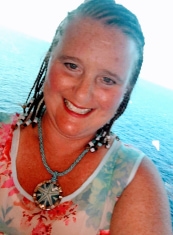
East Palestine High School, East Palestine, OH
Dr. Lisa Bircher taught science at East Palestine Schools in East Palestine, Ohio for thirty years. Although Lisa is most comfortable teaching high school biology and anatomy/physiology; she has also taught Physical Science, Environmental Science, Oceanography and seventh grade life science, over the course of her career. Lisa has been recognized by Kappa Delta Pi as both a Teacher of Honor, and Master Teacher of Honor recipient. She has also been recognized as Presidential Innovation Award for Environmental Educators for EPA Region 5. Lisa holds a Ph.D. from Kent State University in Curriculum and Instruction with an emphasis in science education.
Lisa believes one of the most important contributions she has made to teaching was the creation of a high school science club, and outdoor classroom for East Palestine Schools, intended to be used by all staff, students, and the community for outdoor exploration and education. Lisa also enjoys paper crafting, diamond painting, sewing, and mixed media painting in her spare time. Lisa always enjoys opportunities to write creatively, and is presently working on her memoirs of thirty years teaching science.
Lisa also believes that all students learn best when they are actively engaged in real-world learning opportunities. Whether these opportunities are lab-based, project-based, or service-learning oriented, she feels all students deserve to be involved in experiences that expand beyond the classroom. She believes learning science is a lot like learning a new language, and the learner must use science in their life experience to become truly proficient. Science can, and should include outdoor learning opportunities and projects that span time, space, as well cut across traditional curriculum boundaries. She believes science is one of the most important ways of knowing the world in the 21st century, and therefore, all creative opportunities should be embraced in teaching and learning science. In an effort to create scientifically literate citizens, she has helped students engage in numerous project and citizen science efforts. In the pursuit of these goals, Lisa has earned numerous grants to fund these projects, and has also written several articles for National Science Teachers Association in an effort to educate other teachers about how it is possible to reach students with these opportunities.
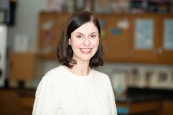
Troy High School, Troy, MI
Rebecca Brewer has taught biology at Troy High School in Michigan for 23 years and co-authored a biology textbook called "Biology Now." She has created educational resources for Science Friday, PBS NewsHour, the Curie Society, the Fred Hutch Cancer Center, BSCS, the Centers for Disease Control, NSTA, MiniOne Systems, and the National Center for Science Education (NCSE). The snake speciation storyline she authored for NCSE was featured at the NABT Evolution Symposium in Atlanta in 2021 and virtually at the NABT Darwin Day Webinar in 2022. This past July, Rebecca co-hosted a one-day workshop for 30 Michigan teachers featuring the NCSE snake speciation storyline, and thanks to a grant from the Society for the Study of Evolution, was able to provide the teachers with kits to bring this resource back to their classrooms.
Rebecca is a Teacher Ambassador for the Teacher Institute for Evolutionary Science (TIES), NCSE, and Concord Consortium, along with a Teacher Consultant for MiniOne Systems where she trains teachers on their equipment at CollegeBoard AP Biology Summer Institutes. She worked with Concord Consortium and Michigan State University on a 4-year NSF grant to develop the ConnectedBio simulation on deer mice evolution. Her freshmen students have piloted the EvolvingSTEM curriculum, allowing them to witness bacteria evolve in under a week. Her AP Biology students have worked with yEvo to observe yeast evolve tolerance to caffeine, with the results of this 5-week research study being published soon.
Rebecca serves as the Michigan Director for the NABT Outstanding Biology Teacher Award Program and was herself an honoree in 2008. She has received over 40 educational grants, most notably $27,000 for her classroom as the 2011 first-place winner of the ING (Voya) Unsung Hero Award.
Personal Statement: Evolution is the foundation of biology and spans all the units of my biology courses. An ongoing driving question my classes revisit is "How is life so diverse, yet so similar?". To tackle this query, students conduct scientific investigations that examine authentic data, argue from evidence, connect concepts within and between units, and present what they uncover through model construction. The ultimate goal is to shift instruction to a deeper analysis of biological concepts and facilitate student discourse to guide their sensemaking and learning progression.
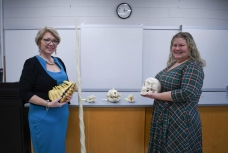
Walters State Community College, Morristown, TN
Dr. Kelly Moore is an Associate Professor of Biology at Walters State Community College (WSCC), where she teaches Biology courses for non-majors, science majors, and pre-education majors. She serves as internship coordinator for biology majors and is co-advisor of the college’s BioClub. She holds both associate and bachelor's degrees in biology, a master’s degree in environmental health, and a doctorate degree in educational leadership. She is also a certified master herpetologist and is currently working on a certification in Spanish.
She serves as the District VI Director of National Science Teaching Association, the District IV Representative of Tennessee Science Teachers Association, and is Co-Vice President of Tennessee Association of Biology Teachers. When she isn’t in the college classroom, she is designing and implementing science programs for students and teachers in preK-8 in the WSCC service area and beyond. These include teaching Kids College programs, Science and Math camps, talented and gifted programs, and leading teacher workshops. In 2018, she became very involved with the Hispanic population in eastern Tennessee after realizing this population was in need of more assistance and resources. She became a STEM Specialist and Faculty Mentor for WSCC’s Recruiting Hispanics to Achieve program. This led to creating, implementing, and assisting with community outreach, STREAM camps, bilingual campus visits, bilingual resources, etc. Her goal is to help increase the number of Hispanic students in STEM fields by create a STEM pipeline for Hispanic students beginning in elementary school and continuing through post-secondary.
Personal Statement: My science teaching philosophy starts with an Albert Einstein quote. “Everybody is a genius. But if you judge a fish by its ability to climb a tree, it will live its whole life believing that it is stupid.” Every student is distinctive, and every student learns in a different way. Each student has unlimited potential, and it is my job to find a way to teach them biology in way that helps unlock a portion of that potential. In order to do this, I rely on three basic keys to success.
The first key is relationship building. It is very important to me that students see me as someone who is on their team and someone who is cheering them on from the sidelines. This is very important in a community college setting because we are dealing with students who are generally non-academically prepared, first-generation, and are from underserved areas who are very likely to dropout. Having that one person to stand for them can make all the difference.
The second key is teaching style. Science teaching is no longer about standing in front of a group of students with a PowerPoint presentation and lecturing to them for hours at a time. Today’s generation of community college students have been immersed in technology since birth. As a teacher, this has to play a role in my teaching. Being an effective science teacher in today’s society involves not only inquiry-based learning, but also engaging hands-on activities, and the incorporation of technology. I try to reach as many learning styles as possible with each topic covered. This includes incorporating videos, AR/VR, manipulatives, and games. This is especially effective when teaching non-science major students, who enter the biology classroom with a fixed mindset that they hate science and are going to fail.
The last key to success is having a passion for teaching biology and the sharing of that passion with students. I love walking in the classroom each day and finding ways to show my students how cool biology really is. My enthusiasm is contagious. My goal is for those science haters to leave my classroom with the acknowledgment that science is actually quite awesome.
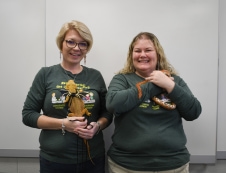
Walters State Community College, Morristown, TN
Elesha Goodfriend is an Associate Professor of Biology at Walters State Community College. She has a BS in Secondary Biology Education from Morehead State University (KY) and an MS in Biological Oceanography from Florida Institute of Technology (FL). She is currently completing her EdD in Educational Leadership at East Tennessee State University (TN). Elesha is the Co-Vice President of the Tennessee chapter of NABT. At WSCC, she teaches non-biology majors’ courses, biology majors’ courses, and pre-service teachers biology courses. She has been activity involved in creating and delivering engaging science content to preK-college students. She has also co-created and lead teacher workshops for preK-16 teachers throughout the state of TN. She believes that science learning is an active process and incorporates numerous types of interactive, hands-on activities to her students to help them grasp difficult concepts and enjoy learning. She feels that ALL students deserve the opportunity to succeed in life and should be afforded the tools to achieve this success. She had become actively involved in the Hispanic outreach organizations at both WSCC and the community wherein she resides, promoting STEM education in students from elementary ages through college. She and a colleague are very active advocates for this population. They have designed and implemented outreach nights to bring Hispanic families to Walters State and form relationships with them, making them more at ease when contemplating college choices for themselves and/or their children. They have also participated in multiple conferences, presenting ideas to aid minority groups in different areas.
Personal Statement: In 1979, an educational researcher by the name of Ron Edmonds set a new precedence for education by saying “We can, whenever and wherever we choose, successfully teach all children whose schooling is of interest to us.” While understanding that there will be struggles and a tremendous amount of hard work, I believe his ideals to be true. When we are passionate about something, we, as educators, make it our mission to pass our knowledge on and interest others.
I do feel as though every student can learn. The key is to find something in your topic that appeals to/relates that topic to the student. Using multiple examples, different teaching strategies, and an enthusiasm for your subject matter tends to involve the students—making them more engaged, which is a component of the WSCC mission. If you, as the instructor, act as though it is a chore to impart your subject matter to the masses, the masses will respond in kind.
Educators must also be willing to adapt. We cannot follow the same patterns/format for every class. The education field is dynamic and exciting with the addition of technology to the classroom. This also helps with student engagement. Not all students will learn in the same manner. Therefore, the instructor must be able/willing to approach the subject matter from different angles.
Finally, I believe that the students must be held accountable for their own learning. Ultimately, the student is responsible for their own actions. However, the instructor should help to instill a desire to participate in and achieve student success.
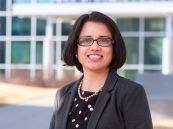
The University of Alabama at Birmingham, Birmingham, AL
Dr. Sami Raut is currently an associate professor of biology at the University of Alabama at Birmingham (UAB). She also serves as a leadership fellow with Graduate School and Global Affairs unit at UAB on endeavors related to graduate education and international partnerships. She holds a PhD in Environmental Toxicology from UAB. She embarked on her professional career at a Hispanic institution in northwest Georgia (Dalton State College, Dalton, GA) before returning to UAB in 2012 as one of the primary course masters for the gateway courses in the department of biology. As a proud Blazer Alumnus, she now finds her calling in teaching various undergraduate classes by embracing the realms of scientific teaching. Furthermore, this immersion has led to the exploration of a new passion - pursuing biology education research. This research to date has engaged 40 undergraduate students in various capacities who are now successfully enrolled in professional schools. Some of these research endeavors pursued by undergraduate students have been translated into publications and various national-level recognitions. Her primary areas of research, includes enhancing science literacy in societal topics of interest including climate change, sustainability, evolution, and vaccine hesitancy.
Personal Statement: My inspiration to teach stems from the wonderful science teachers and mentors I had since my childhood through college. These experiences not only inspired me to attain the highest academic honors but also instilled a deep passion for the teaching profession. Over the years, my teaching philosophy has evolved to meets the needs of the 21st century undergraduate students. To better equip myself with my classroom teaching, I have heavily relied on participating in cutting-edge seminars, workshops and most importantly through teaching as scholarship. I have done this with a sincere desire to arouse, nurture and sustain a student’s natural curiosity towards science. I have utilized many high-impact classroom practices like active-learning, service-learning, and peerpeer learning. I have been able to create an inclusive atmosphere in my classes wherein each student coming from varied backgrounds continues to feel supported and included in science.
Through my words and teachings, I try to instill values of good teamwork, ethics, sincerity, and
hard work in my students. I am extremely demanding of my students, and I set my standards high to enable my students to reach the heights they would have never imagined in their lives!
Indeed, it gives me the utmost joy when that random knock on my doorstep comes from my student who struggled through my courses but nevertheless persisted to give me the news of a scholarship
and/or being accepted into a professional school. I have found this feeling to be extremely rewarding and I wouldn’t trade my teaching job for anything else in this world!

University of California San Diego, La Jolla, CA
Dr. Stanley Lo is a Teaching Professor (with tenure) of Cell and Developmental Biology and Affiliate Faculty in the Joint Doctoral Program in Mathematics and Science Education and the Research Ethics Program at the University of California San Diego. Collaborative projects in his research group examine how faculty conceptions of diversity inform their instructional and mentoring practices, explore how student identities intersect with their experiences and learning, and develop and implement innovative programs to support student success.
Dr. Lo earned his B.S. and M.S. in Molecular Biophysics and Biochemistry from Yale University and Ph.D. in Biochemistry from Harvard University. Before graduate school, he was a high school science instructor at Phillips Exeter Academy, where he first developed his interests in teaching and education research, and prior to moving to California, he was a Senior Research Associate in Learning Sciences at Searle Center for Advancing Learning and Teaching at Northwestern University. At UC San Diego, Dr. Lo developed and teaches a large introductory course-based undergraduate research experience on soil microbiomes for over 2,000 first-year undergraduates each year, a variety of courses that integrate topics of racism with genetics concepts, and graduate courses on learning theories and student identities in science, technology, engineering, and mathematics.
Dr. Lo was a National Academies Education Fellow in Life Sciences in 2011, National Academic Education Mentor in Life Sciences in 2012-2016, and President of the Society for the Advancement of Biology Education Research in 2021-2022. He currently serves as an editor for CBE-Life Sciences Education and CourseSource.
Brown University, Providence, RI
Dr. Karla Kaun is an Associate Professor in the Department of Neuroscience at Brown University. She is a behavioral neurogeneticist by training and is fascinated with the genetic, molecular and cellular mechanisms of memory and addiction. She developed and teaches Neurogenetics courses at Brown University and is passionate about incorporating approaches to increase interest and engagement in course material. Her research team investigates how alcohol and drugs of abuse influence the molecular mechanisms underlying memory formation to induce cravings. To investigate this her team uses a multidisciplinary approach combining behavior with in vivo imaging, genetics, molecular biology, biochemistry and bioinformatics in the fruit fly Drosophila melanogaster. She has developed methods to make Drosophila neurogenetics research accessible for students of all ages and enjoys opportunities to engage in hands-on science into her local community. Karla is the 2023-24 president for the International Behavioural and Neural Genetics Society, enjoys collaborating, and is an advocate for innovative teaching methods to decolonize STEM.
Personal Statement: Neurogenetics is a very new field at the frontier of neuroscience that brings together geneticists and neuroscientists in pursuit of the common goal of understanding the nervous system. Through the two primary courses I developed and teach: Introduction to Neurogenetics, and Behavioral Neurogenetics Laboratory, I’ve created learning environments that develop both an appreciation for and the skillsets necessary to develop an in-depth knowledge of the field of Neurogenetics, and to understand and employ Neurogenetics research.
My goal as a genetics educator is to inspire students with the desire, appreciation and ability to learn. I also believe it is important to rethink education to improve equity and inclusion, and I do so by incorporating creative and interdisciplinary experiential learning in my courses. Deeper Learning encompasses the ideology that students that are very engaged in a specific aspect of the course material think critically, collaborate, communicate effectively, direct their own learning, and believe in themselves. Introduction to Neurogenetics and Behavioral Neurogenetics Lab incorporate this philosophy by: 1) allowing students to choose a topic within the field of neurogenetics that engages them, and 2) using interactive learning techniques that involve class discussion and peer feedback.
Through development of ideas, reiterative writing and sharing their projects, students gain an understanding of the central theories and methodologies of the field of neurogenetics, and gain an understanding that science is a continual process of investigation and interpretation. I’m grateful to my students and fellow educators for inspiring me to improve the ways I learn and teach.
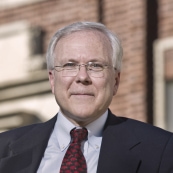
University of Arkansas, Fayetteville, AR
Dr. William F. McComas is the inaugural holder of the Parks Family Endowed Professorship in Science Education at the University of Arkansas following service as a secondary school biology teacher in suburban Philadelphia and professorship at the University of Southern California. He is interested in laboratory teaching, informal science learning, evolution education, science for gifted learners and the intersection of philosophy of science and science instruction. McComas has given more than 100 keynote speeches in the U.S. and a dozen other countries and writes frequently on a variety of science education topics. His book "Nature of Science in Science Instruction: Rationales and Strategies (Springer, 2020)" joins "The Language of Science Education (Brill, 2014)" and a pictorial account of "The Scopes Monkey Trial (Acadia, 2016)" co-written with Randy Moore.
McComas has been the Editor of The American Biology Teacher for more than a decade. He has been honored by NABT, NSTA, NCSE and ASTE for work in evolution education, research in biology teaching, innovations in college science teaching and mentorship. He is president-elect of the Association for Science Teacher Education (ASTE). McComas was a Fulbright Fellow at Dublin City University, Ireland, is a Fellow of the American Association for the Advancement of Science (AAAS) and the Linnean Society (UK), and has been named a Distinguished Professor at the University of Arkansas. He is particularly proud of the students whose dissertations he chaired, fifteen of whom are now professors of science education.
Personal Statement: My science teaching philosophy has long been based on "four E's": experiences, enthusiasm, expectations and extending beyond. These factors are always present in mind as I design instruction and present lessons both for those who are studying a specific science discipline and for those who are learning how to teach.
The first “E” relates to the variety of experiences I like to provide students because not all students can learn with the same stimuli. As a biology teacher, it was not unusual for my students to engage in a laboratory activity, see a self-made presentation featuring photographs I have taken at field sites around the world, participate in a bioethical conflict resolution exercise or view segments of pertinent videos all within the same week! The second "E" relates to my desire to teach by enthusiastic example. Teachers must be authentically interested in what they are teaching and demonstrate that regularly. Toward that end, I typically share my personal interests in the history of science through photographs at classic locations in Greece and Turkey along with images of biological phenomena from sites across 100 countries I have visited. This includes tracking lemurs in Madagascar investigating the impact of acid rain in the Adirondacks, visiting museum collections in Berlin and the world’s largest flowers and orangutans in Borneo.
Expectations are a keystone element of my teaching philosophy and are vital to student success: this is the third “E.” Students must know that they have responsibilities to their own learning. However, to be successful students must know what is expected of them and with knowledge develop a sense of responsibility and control over their lives. The tests and essays of school will be replaced by reports and contracts, and the due dates now will be the expectations of the future.
Finally, extending beyond - on a personal level -- is the final "E." Teaching can be one of the most challenging and rewarding job, but that choice belongs with the individual educator. My participation in a variety of science teaching organizations has demanded that I remain focused and up to date, transforming the job of teaching into a satisfying career that has lasted decades. This is particularly true with my service to NABT through my work as editor of The American Biology Teacher. It has been a joy to extend the reach of countless authors worldwide and share their ideas and insights with biology educators across the globe.
These four factors: experiences, enthusiasm, expectations and extending beyond, have served well as a useful philosophy during my years as a high school biology instructor and are equally relevant in my present work informing and preparing new teachers for the vital role they play.
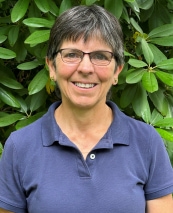
Oakton High School, Vienna, VA
Jackie was born in Venezuela and raised in Santiago, Chile. She received a B.S. degree in Marine Biology and a Master’s degree in Zoology from Universidad de Concepcion in Chile, where she studied fish parasites. Jackie continued her research on parasite ecology at Wake Forest University with Dr. Gerald Esch and received a Ph.D. degree in Biology in 1991. Jackie served as Biology Curriculum Coordinator at Wake Forest and later was an assistant professor at the University of Idaho. She published more than 20 research articles and coauthored two books on parasitology.
After taking time off to have two children, Jackie reentered the education arena in 2000 as an elementary school instructional assistant at Stenwood Elementary, in Vienna, Virginia. In 2005, Jackie earned a secondary education certification from George Mason University and began teaching high school biology in Fairfax County Public Schools (FCPS). After one year at Falls Church HS, she has taught at Oakton HS since 2006. Jackie has been involved with the AP Biology program since 2008 and has been an AP Biology Reader, speaker at several FCPS venues, and AP Biology cohort leader and mentor for FCPS AP Biology teachers.
Jackie currently teaches AP Biology, and Genetics & Biotechnology, and has been the coach of Oakton’s Scholastic Bowl Team since 2010.
Jackie has received a number of school, county, and state teaching and service awards, including the 2008 National Outstanding New Biology Teacher Award from the National Association of Biology Teachers.
Personal Statement: I started teaching AP Biology in 2008 by “borrowing” many of the materials of the late Kim Foglia, and I am a strong believer in the power and benefits of AP classes. I have a few simple guiding principles: I believe students need to have ownership of their learning, that science education should be engaging and connected to real life because science permeates all aspects of what we do, that good relationships with students and colleagues need to be cultivated and are paramount, that good resources need to be freely shared with fellow teachers to enable continuous improvement, and that teachers and administrators need to foster a sense of community beyond the classroom.
All students, regardless of their capabilities, should learn fundamental scientific principles through hands-on experimentation supported by clear explanations and driven by their natural sense of curiosity. By practicing science, students develop the skills and ideas needed to become critical thinkers, analysts, and life-long learners to make informed decisions when they become adult members of society. I want all my students to love science as much as I do. I want them to become science dispersers, explaining to their families and others how life works so we can all make personal connections and apply them to our daily lives. Then we are more likely to take better care of ourselves and our planet.
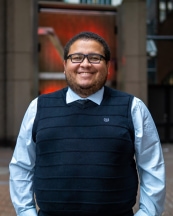
Florida International University, Miami, FL
Alexander Eden is a graduate from the University of Massachusetts Lowell with both a BS and MS in Biological Sciences. He is a proud first-generation college graduate from a Latino family. After wrapping up his studies, he taught biology to a diverse population of students at Greater Lowell Technical High School in Tyngsborough, MA. During his time in the classroom, he integrated inquiry-based strategies to promote scientific skill building. His pedagogy has been recognized with awards from associations such as the Massachusetts Association of Science Teachers and the National Science Teaching Association. Most importantly, he prioritized building relationships and spreading positivity. As such, at the end of every class he would remind students to “spread good vibes.”
Today, Alex is a PhD student researching biology education at Florida International University in Miami, FL. In this new role, he has been able to continue teaching, now at the college level, while also exploring his research interests further. He is grateful for all the experiences that he has had in and out of the classroom that has brought him to where he is today. To wrap this biography up, Alex would like to ask the reader/listener the same question that he asks his students: what is something good that happened to you recently?
Overall Philosophy: My goal as an instructor is not to bore students with the material but to engage them in a different way of thinking. I am a huge believer in participating and taking risks. I would rather students feel more confident in their ability to interpret a data table than reciting a memorized definition.
In my class, we are a team. Students can learn from me as much as I can learn from them. I am not perfect and would never expect them to be. Curiosity drives learning, if a random question appears, students should ask away! Embracing those moments is critical in having a valuable experience.
Lastly, feedback is always welcomed. I am not just an instructor, but I am a co-pilot on this flight to success.
Good Vibes Philosophy: I believe that there is no force greater than the force of positivity. I enter the classroom ready to spread good vibes in whatever way that I can. I encourage my students to do the same. Complimenting someone, thanking a worker, telling a friend you appreciate them, can all make a huge difference. Each class ends with a reminder to spread good vibes at all times.
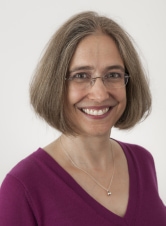
Montgomery College, Rockville, MD
Dr. K. Rebecca Thomas, biology professor and department chair at the Montgomery College (MC) campus in Rockville, Maryland, is dedicated to helping students succeed throughout their academic careers and to fostering a deep understanding and appreciation for the power of STEMM to address global and community issues. Her two decades of teaching have focused on introductory courses for biology majors and non-majors, including Environmental Biology and courses that introduce students to principles of Ecology & Evolution. Her teaching emphasizes the interdisciplinary nature of science and encourages students to apply chemical, physical, and quantitative principles to biology.Currently, she is MC's lead researcher on a collaborative National Science Foundation (NSF-IUSE) funded project called the NEXUS Institute for Quantitative Biology (NIQB). In this role, she supports MC biology and math faculty collaborating with colleagues at University of Maryland, Baltimore County, and three other Maryland community colleges to integrate quantitative skills into introductory biology courses.
She’s been an active member of the NABT 2-Year College Section since 2017 and has co-presented NIQB project work at the annual conference. During the COVID-19 pandemic, Dr. Thomas served as scientist on MC's Coronavirus Advisory Team. In that role, she helped MC leadership keep students and employees safe, while she also fostered scientific understanding through outreach to the broader campus community. Her other professional interests include: STEM transfer student success; effective academic advising for STEM students at two-year colleges; fostering DEIB in STEM education spaces; support for part-time biology faculty; and basic needs security for two-year college students.
Personal Statement: Service to two-year college students is at the heart of my teaching and professional work. In the classroom, I foster an inclusive, learner-centered environment, I engage students with active and experiential learning techniques, and I empower them with critical thinking and scientific reasoning skills. Whether I’m working with non-science majors or students pursuing STEMM disciplines, I meet students wherever they are on their academic journeys, and I connect them with mentorship, resources, and supports to achieve their goals. In the process, I find immense joy in imparting my love for biology and my passion for life-long learning to my students.
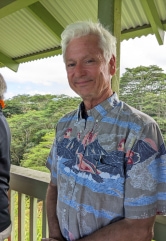
Solano Community College, Vacaville, CA
National Association of Biology Teachers NABT) Life Member Jim DeKloe serves as the director and founder of the Industrial Biotechnology program of Solano College in the North San Francisco Bay area. This program emphasizes biomanufacturing by training students to work in companies that are located in the biotech manufacturing cluster in Vacaville, CA (located halfway between San Francisco and Sacramento). This program was one of the first in the United States designed to teach the skills and knowledge required to go into the manufacturing (rather than research) sector of the biotech industry. Since its founding, this program has served as the model for biomanufacturing programs around the country. He recently designed and implemented a Certificate of Achievement in Cell and Gene Therapy – the first certificate of its kind in the country to focus on this emerging field.
In 2015, Jim led the successful effort that resulted in the approval for Solano College to offer a Baccalaureate Degree in Biomanufacturing; that made Solano College one of only fifteen community colleges approved at the time to offer a Baccalaureate degree for the first time in California history.
He played a key role working with architects to design a $34 million building on the Vacaville campus that contains four biomanufacturing suites to train students in biomanufacturing
Putting these programs together with partnerships with both high schools and graduate programs, this creates a complete educational pathway from articulated high school programs to several certificates to an Associates degree that flows seamlessly into the Bachelors degree with admission into one of nine different graduate programs; this pathway has multiple entry and exit points. Graduates enjoy a near 100% placement rate.
Personal Statement: Several recent studies predict that global bioeconomy will expand to become a $4 to $30 trillion economy in the next decade. This means that the United States will need a million more workers in biotechnology. This fundamental change in the economy and society (a fourth industrial revolution) means that a Biology major becomes the hottest major of them all. At the same time few people, and even few biologists, know that this field exists or about the tremendous career potential waiting for new graduates. We all need to work to change that.
I intend to continue working with teams from the NSF-funded biotechnology consortium InnovATEBIO (www.innovatebio.org ) and with the Manufacturing USA Innovation Institutes NIIMBL (www.niimbl.org), BioMADE (www.biomade.org), and ARMI BioFab (www.armiusa.org), and with the Algae Foundation’s ATEC group (Algae Technology Educational Consortium) to publicize the tremendous career potential of biotechnology and its role in a carbon-neutral circular bioeconomy. And to develop curriculum to teach the subjects in this field.
The upcoming generation does not want to merely pick up a paycheck. They would like to make a difference in the world. With this field they can. With cell therapy, physicians are using the “C word” for the first time – they are talking about a Cure for cancer. With gene therapy and stem cells, the blind will see, the deaf will hear, the disabled will walk, and children with devastating genetic disorders will be spared. Products currently manufactured from raw materials extracted from petrochemicals will instead use starting materials produced by organisms – thus reducing greenhouse gas production.
We need to introduce every biology student to pharmaceutical biotechnology, industrial biomanufacturing, cell and gene therapies, RNA vaccine production, endosomes, algae production, and the processes used to grow multiple cell types and to isolate the products that are produced.
We need to recruit a million more people into this field, and therefore every biology class should include biotechnology instruction. Our motto should be “No biology major left behind.”
This award is named the Ron Mardigian Biotechnology Award. I am especially honored to receive it since I knew Ron Mardigian. In the early days of Bio-Rad’s Explorer biotech education department he introduced Green Fluorescent Protein as a teaching tool – and this legacy has illuminated concepts of biotech for generations of students. The GFP transformation kit with the Bio-Rad “Green Bean” can now be found in most biology classrooms in the United States. As I accept this award, I would like to honor his memory.
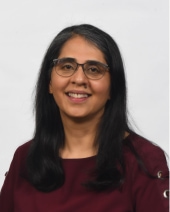
Waubonsee Community College, Sugar Grove, IL
Dr. Sheela Vemu is an Associate Professor of Biology at Waubonsee Community College, Sugar Grove, IL. With a solid foundation in Pharmacology and Molecular Biology from her doctoral training, she has embarked on a remarkable journey that has seen her pivot toward science education. Her passion is crafting inclusive and student-centric learning environments that inspire academic growth. Her commitment to educational excellence goes beyond her role as an educator. Her involvement in prominent educational initiatives, such as the BioQUEST curriculum consortium and developing the AJEDI Scientific Teaching Course with Tiny Earth and the National Institute of Scientific Teaching (NIST), highlights her dedication to shaping the future of community college science education. As an Editorial Board member for CBE-Life Sciences Education (LSE) journal, she contributes her insights to the broader discourse of biology education research from the community college lens. In her mentorship role within the Promoting Active Learning & Mentoring (PALM) network, she has been committed to nurturing fellow educators and students. As an advocate for quantitative data literacy development in community college settings, she champions the integration of discipline-based Undergraduate Experiences (UREs) to foster inclusivity. Her dedication extends to the Community College Anatomy and Physiology Research Project (CAPER), where she employs case studies and guided inquiry to instill effective study strategies and metacognitive skills in her students, especially those pursuing allied health careers.
Personal Statement: As a community college teaching practitioner, my primary objective is to cultivate a robust scientific identity within my students and empower them with the skills and confidence needed for successful careers in transfer and allied health fields. I achieve this by immersing students in genuine scientific experiences that extend beyond the confines of the classroom. Through this immersive approach, I aim to assess and solidify their understanding of physiological and microbial concepts, enabling them to evaluate claims and hypotheses critically. Guided inquiry and active learning are cornerstones of my teaching methodology, fostering a comprehensive understanding of biological and physiological concepts across diverse sub-specialties within biology. I firmly believe in a strengths-based approach, which focuses on nurturing each student's potential rather than dwelling on deficits. While we work together to find solutions, I remain acutely aware of the challenges that may hinder our community college students from realizing their full capabilities.
Creating a sense of community among students in STEM fields is a central tenet of my teaching philosophy. I am dedicated to fostering mentor-mentee relationships inside and outside the classroom as we embark on undergraduate research experiences using the innovative Tiny Earth modules on bioprospecting and biopiracy. This approach enhances their scientific knowledge and imbues them with invaluable critical thinking, problem-solving, and practical communication skills. Teaching is a profound means of connection, especially with my students. Their unique perspectives and insights continually shape how I approach education. My aspiration for every student is that they depart from my class not only equipped with a comprehensive understanding of the subject matter but also armed with the ability to assess new information critically.

The National Association of Biology Teachers empowers educators to provide the best possible biology and life science education for all students.
NABT, P.O. Box 335, Heber City, UT 84032
office@nabt.org | Fax: (202) 962-3939
(888) 501-NABT or (703) 264-9696
Thank you for visiting the NABT website.
Our privacy policy is found here.
Announcements for products or services on this website do not imply endorsement of or by NABT.
Website by Morweb.org
Copyright National Association of Biology Teachers
